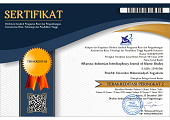Television Mass Media Relations to Culture Shifts in Besilam Malay Community
Abstract
Keywords
Full Text:
PDFReferences
Fuad Said,Syeikh Abdul Wahab Rokan: Tuan Guru Babaussalam Medan: Pustaka Babussalam, 1983.
Garna, Judistira K. Ilmu-ilmu Sosial; Dasar, Konsep, Posisi[Social Sciences; Basis, Concept, Position]. Bandung: Postgraduate Program of PadjajaranUniveristy.1996.
Gary Yukl, Kepemimpinan Dalam Organisasi Edisi Indonesia[Indonesian Edition of Leadership in Organizations], Jakarta: Indeks, 2011.
Harsojo, Pengantar Antropologi [Introduction to Anthropology], Ed. 4, Publisher: Bina Cipta, 1982.
J. Fachruddin Daulay, et.al. Sejarah Pemerintahan Kabupaten Daerah Tingkat II Langkat[History of District Government Level II Langkat]. Langkat: Collaboration between the Level II Local Government of Langkat and the Department of History Faculty of Letters the University of North Sumatra, 1994.
J. Suyuti Pulungan, Pemimpin dan Kepemimpinan dalam Persfektif Islam[Leaders and Leadership in Islamic Perspective], Yogyakarta: Idea Press, 2014
John Lofland dan Lyn H. Lofland, AnalyzingSocial Setting: A Guide to Qualitative Observation and Analysis, Belmont: Wadsworth Publishing Company, 1984.
Linton, R. The Study of Man. New York: Century Company. 1936.
Shafwan Hadi Umry, Tradisi Berahoi Masyarakat Melayu ; Ritual Pangan Dalam Alam Sumatera Timur[Berahoi Tradition of the Malay Community; Food Rituals in the Nature of East Sumatra], MITRA Publisher Ikatan Penerbit Indonesia (IKAPI), New Edition 2015
Soekanto, Soerjono. Teori Sosiologi Tentang Perubahan Sosial[Sociological Theory of Social Change], Jakarta: Rajawali Press. 1987
Sugiyono, Metode Penelitian Kuantitatif, Kualitatif dan R&D[Quantitative, Qualitative and R&D Research Methods], (Bandung: Alfabeta, 2008
Veegers, K.J. Realitas Sosial; Refleksi Filsafat Sosial atas Hubungan Individu-Masyarakat dalam Cakrawala Sejarah Sosiologi[Social Reality; Reflection on Social Philosophy on Individual-Society Relations in the Horizon of Sociological History]. Jakarta: Gramedia Pustaka Utama.1993.
Wahab Abdul Aziz, Anatomi Organisasi dan Kepemimpinan Pendidikan[Organizational and Educational Leadership Anatomy], Bandung: Alfabeta, 2011.
Warjio, Heri Kusmanto, Muhammad Zubeir Sipahutar, Proceeding of the 14th ISDEV International Islamic Development Management Conference (IDMAC 2019)
DOI: https://doi.org/10.18196/afkaruna.v20i1.19672
Refbacks
- There are currently no refbacks.
Copyright (c) 2024 Afkaruna: Indonesian Interdisciplinary Journal of Islamic Studies

This work is licensed under a Creative Commons Attribution-ShareAlike 4.0 International License.
Afkaruna: Indonesian Interdiciplinary Journal of Islamic Studies indexed by:












1.png)


